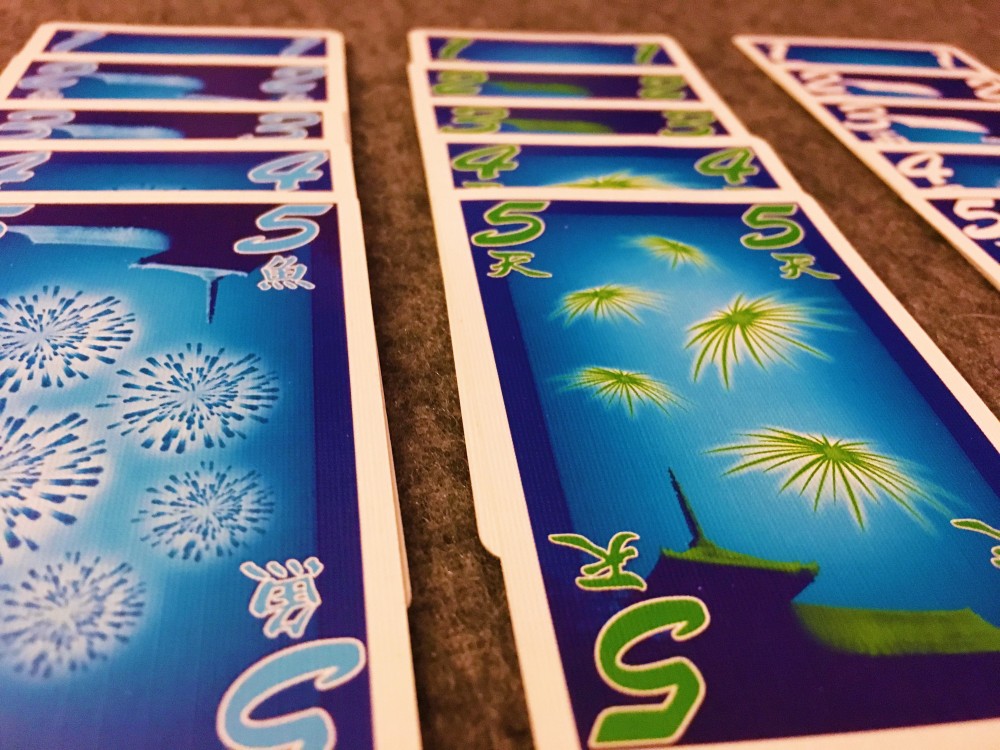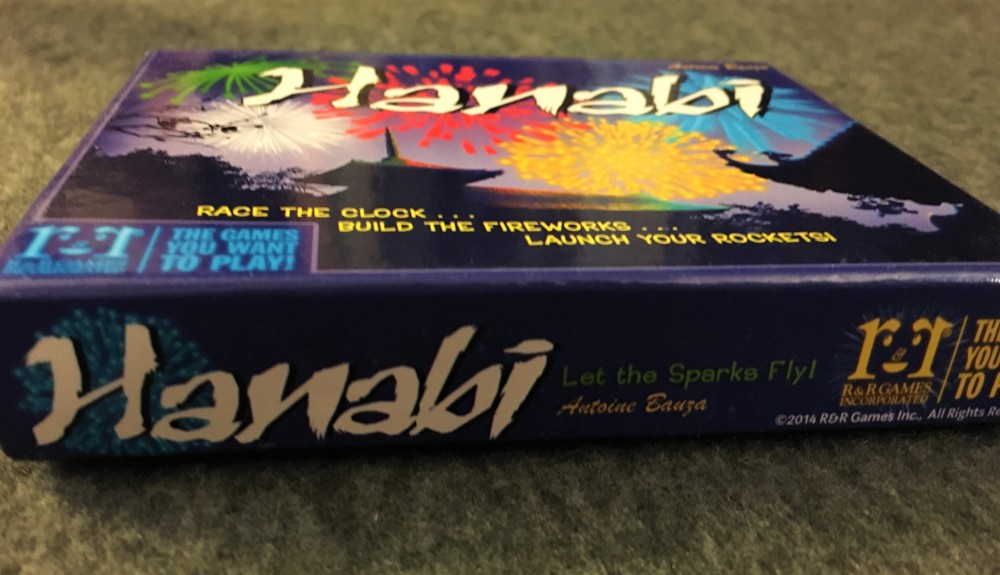
Fireworks – a universal symbol for celebration. In the cooperative game Hanabi—named for the Japanese word for “fireworks”— players work together to try to create the perfect fireworks show.
Designer: Antoine Bauza
Artist: Antoine Bauza, Gérald Guerlais, Albertine Ralenti
Publisher: R&R Games
Genre: Cooperative Game
Players: 2-5
Play time: 25 minutes
Number of Logged Plays: 10+
Buy it on Amazon via He said, She Said Games
Skip ahead to find out:
Game Play
What He Said
What She Said
Our Pros and Cons
The Verdict
Game Play
The Hanabi deck contains cards in five suits (white, yellow, green, blue, and red), each numbered 1-5 (three ones, two each of twos, threes, and fours, and one five per suit). An extra suit of cards, rainbow colored, is also provided for advanced or variant play. Players work together to try to place cards for each color in order from 1-5.

Here’s the catch: only other players can see your cards. So how do you know what cards to play? Other players give hints regarding the numbers or the colors of their cards. Players must act as a team to avoid errors and to finish the fireworks display before the cards run out. In addition, the game has eight available information tokens and three fuse tokens.
Play proceeds around the table; each turn, a player must take one of the following actions:
- Give information: Point out the cards of either a given number or a given suit in the hand of another player. The information given can only be about a number or a color, but not both. It is allowed to indicate that a player has zero of something. For example, you can point at two cards and say, “These two cards are green.” Giving information consumes one information token.
- Discard a card: The player chooses a card from his hand and adds it to the discard pile, then draws a card to replace it. The discarded card is out of the game and can no longer be played. Discarding a card replenishes one information token.
- Play a card: The player chooses a card from his/her hand and attempts to add it to the cards already played. This is successful if the card is #1 of a suit that has not yet been played, or if it is the next number sequentially in a suit that has been played. If the card cannot be played, a fuse token is consumed and the misplayed card is discarded. Successfully playing a five of any suit replenishes one information token. Whether the play was successful or not, the player draws a replacement card.
Players lose immediately if all fuse tokens are gone, and win immediately if all fives have been played successfully. Otherwise play continues until the deck becomes empty, and for one full round after that. At the end of the game, the values of the highest cards in each suit are summed, resulting in a total score out of a possible 25 points.
The final score is calculated and qualified like below:
0-5 Oh dear! The crowd is booing!
6-10 Poor! Hardly any applause.
11-15 Ok! The audience have seen better.
16-20 Good! The audience is pleased.
21-24 Very good! The audience is enthusiastic!
25 Legendary! The audience will never forget this show!
He Said
Hanabi is a nice portable game that’s really easy to learn and quick to play. This has made it one of our go-to games for travelling because we can play it anytime we have a lull in the day.

This is the first game we’ve played where we’re not able to see our own cards. After reading the rules, we didn’t think that the game would be too difficult to get a decent score, but we were sorely mistaken as we scored about eight points in our first game. If you couldn’t tell already, the game is pretty challenging because it requires that cards come out at the right time in order to get a perfect score.
It’s also challenging because you need to decipher what card the clue giver is trying to get you to choose, especially if their clue encapsulates more than one card. There have been many times when I’ve chosen the wrong card and could immediately tell see my mistake as Mandee started to look disappointed after I say which card I’m choosing to play/discard.
The feeling of choosing correctly is really rewarding though, especially when it’s from a multiple card clue. It’s even more rewarding as a group when you get to the end of the game and see a nice looking board of fireworks that you completed. I think the highest score we’ve ever gotten has been 21, which was pretty exciting because we had previously only had a high score of about 17 or 16.

There are times though where you know that you’ve destroyed your chances of a perfect score pretty early on since there are only a limited number of each number per color. If you get a pretty good card draw, it wouldn’t be too hard to get a good score, but the quality of your hand diminishes once you act on obvious clues. Then you’re only left with clues that are open for interpretation.
Since this has been a good vacation game for us, we typically only play the game as a two player game, but we have played it with four and five players. We prefer to play with two because with four players there’s a lot more information to remember. There are some turns where you’re forced to play/discard a card without much information if there are no clues thrown your way and the clue tokens are out. I think playing with the same group repeatedly and taking the time to formulate a strategy would help alleviate this so each player can make an informed decision on their turn. I will say that getting a high score with more players would create a greater sense of achievement because there are more variables to consider.
In this game, it’s very easy to accidentally (or intentionally) cheat because there are a lot of verbal and nonverbal cues you can implement into your clue. It is kind of hard to resist the temptation to not make a face when someone is holding their finger over a card you don’t want them to pick. This is a pretty similar situation to being the clue master in Codenames except everyone will get to experience it multiple times in a single game of Hanabi.
Although the game is random, there is a limited amount of replayability – at least for us. Once we broke into the 20’s for our scoring, we felt pretty satisfied with that score and our urge to try to further improve our score went away. This lead to us playing other games rather than Hanabi on game nights. So I feel like the replayability of the game will drop once you achieve a score that you are content with, especially if you’ve been able to achieve a perfect score before.

Overall, I would recommend this as a family game because it encourages good communication and a rewarding feeling when you select the right cards. It’s also very portable and would be an easy game to travel with and introduce to people who may not have much experience with games. There is a limited amount of replayability, depending on your attitude towards going for a perfect score, but you’ll be getting pretty good value out of this game regardless since it’s only $10. This isn’t a game we play very often nowadays, but it does provide a good cooperative experience and I would recommend it for anyone who really enjoys a good cooperative game.
She Said

Hanabi is one of our favorite games to bring on vacation. The box is small, and the game is very easy and quick to play. We first bought it four years ago and have since taken it on many different trips.
This is one of the first games we’ve played with the mechanism of not being able to see your own cards. Although this can be a frustrating aspect of the game, it makes it incredibly challenging and fun at the same time. When you receive a clue, it can often become a mental game. You begin to question why someone gave you a certain clue. Is it because they want you to get rid of a card you no longer need? Or is it to play a card that’s needed? There have been a number of games where I’ve interpreted incorrectly.

In many cooperative games, there’s always the risk that one player dominates others (I’ve definitely been that player). In Hanabi, that’s not possible because you can’t see your cards and only one person can give you a clue at a time. The major downside to this game is how easy it is to cheat. You’re really just playing against the game, and the rules are not very strict. This makes it incredibly easy to let illegal clues slide in the game.
More often than not, we play this game as a two-player game, but we have played with more players. I prefer this as a two-player game because the more players you have the more likely it is that you’ll be stuck doing the same action every time. When you have 4-5 players, by the time it backs around to you, your action is already predetermined based on what everyone else did so it can get a little repetitive. Also, it’s incredibly hard to keep track of what was said, especially if your memory sucks like mine.
Despite all this, we’ve never gotten more than 20 in this game. I’m fairly positive it’s almost impossible to get a perfect score. Either that or Calvin and I are terrible communicators. Usually we run out of the card we need (like discarding a five on accident).

Overall, I recommend this game for someone looking to get into cooperative games that allow for everyone to equally contribute. This game does make an excellent travel game, and is quick and easy to learn. All in all, Hanabi is definitely worth adding to your collection.
Pros and Cons
Pros:
- Interesting game mechanism with not being to see your own cards
- Good cooperative game
- Great two-player game
- Great travel game
- Easy to learn and teach
Cons:
- Dependent on how great other player’s give clues
- Need a great memory
- Easy (and tempting) to cheat
- Not great to play with 4-5 players
- Not much replayability
The Verdict
He gives this game 5.5 fireworks out of 10.
She gives this game 6.5 fuse tokens out of 10.
